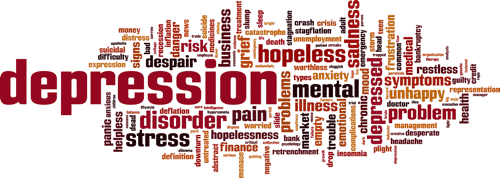So What Do Signs of Depression Among the Elderly Look Like?

Do you feel out of sorts and struggle to get through the day? Have you lost interest in hanging out with friends and family? It’s possible that you might be experiencing the signs of depression, but the good news is that it’s treatable. Depression among the elderly is quite common, whether due to medications, dementia, or aging. But, by staying healthy, staying engaged, and seeking professional help you can feel better and combat the symptoms of depression.
Depression can affect anyone, no matter your age. However, it might be difficult to recognize the signs of depression in your elderly loved ones, and they may find it difficult to notice the signs in themselves. Knowing some of these signs of depression and symptoms will help you recognize depression among the elderly:
SIGNS/SYMPTOMS OF DEPRESSION
-Lack of Energy -Feelings of Despair -Sadness
-Memory Problems -Loss of Interest -Thoughts of Suicide
-Weight/Appetite Loss -Sleep Disturbances -Drug/alcohol use
-Ignoring Personal Hygiene -Lack of Motivation -Self Loathing
Despite these signs of depression, and symptoms of depression, it’s possible that they can be caused by side effects of certain medications, especially if taking several medications at once. The elderly tend to be more sensitive to medications since we metabolize things less efficiently as we get older.

In addition to specific medications, there are certain medical conditions that can cause confusion and attention deficits, which resemble symptoms of depression either directly or indirectly.
MEDICAL CONDITIONS THAT CAN CAUSE SYMPTOMS
– Dementia/Alzheimer’s -Diabetes -Stroke – Parkinson’s Disease
-Heart Disease -Cancer -Multiple Sclerosis -Lupus
Now that you know the signs and symptoms of depression, what can you do to help your elderly loved one that’s feeling depressed?
WHAT TO DO?
 Stay healthy – Taking care of your mind, body, and spirit has a tremendous impact on symptoms of depression. Getting adequate and valuable sleep can help to combat sleep problems most often associated with depression. In addition to sleep, exercise is another important way to treat depression. Exercise releases endorphins and adrenaline that improves your mood. You don’t have to go to a gym to get exercise…you can walk, do housework, or even garden to reap the same benefits. What you put inside your body is just as important as what you do to the outside. Not eating enough food or eating the wrong kinds of foods (sugar, starch, etc) can worsen your symptoms of depression.
Stay healthy – Taking care of your mind, body, and spirit has a tremendous impact on symptoms of depression. Getting adequate and valuable sleep can help to combat sleep problems most often associated with depression. In addition to sleep, exercise is another important way to treat depression. Exercise releases endorphins and adrenaline that improves your mood. You don’t have to go to a gym to get exercise…you can walk, do housework, or even garden to reap the same benefits. What you put inside your body is just as important as what you do to the outside. Not eating enough food or eating the wrong kinds of foods (sugar, starch, etc) can worsen your symptoms of depression.
 Stay engaged – You may not feel like doing anything when you’re feeling depressed. But one of the best ways to counter the feelings of depression is by engaging with others. The more you socialize, the better you will feel. You can also expand your social circle by joining classes or clubs such as book club, art class, or exercise class. If you can, get out and take a walk, go shopping, or even visit a friend. But remember…socialization doesn’t have to be face-to-face. Even communication via email or phone helps to raise your spirits. Whatever you do, be sure to laugh. Laughter is said to be the best medicine. So, go ahead…stay engaged and boost your mood!
Stay engaged – You may not feel like doing anything when you’re feeling depressed. But one of the best ways to counter the feelings of depression is by engaging with others. The more you socialize, the better you will feel. You can also expand your social circle by joining classes or clubs such as book club, art class, or exercise class. If you can, get out and take a walk, go shopping, or even visit a friend. But remember…socialization doesn’t have to be face-to-face. Even communication via email or phone helps to raise your spirits. Whatever you do, be sure to laugh. Laughter is said to be the best medicine. So, go ahead…stay engaged and boost your mood!

Seek help – Having feelings of depression can be quite normal, so you should never feel embarrassed to ask for professional help. Antidepressants for elderly individuals should be used cautiously since seniors are more sensitive to the side effects of prescribed medications. Treatment such as counseling or lifestyle changes can be quite effective. While medication may treat the symptoms of depression, counseling helps to address the underlying cause. Lifestyle changes can affect every part of your life including work, social, and personal.
Many seniors may feel depressed but do not recognize the signs and symptoms of depression, and therefore do not know what to do to help themselves. Just know that you can take steps to change how you feel.
If you feel that you or your loved one is depressed, use this online “Geriatric Depression Scale” form. It might help determine if professional assistance is needed.

